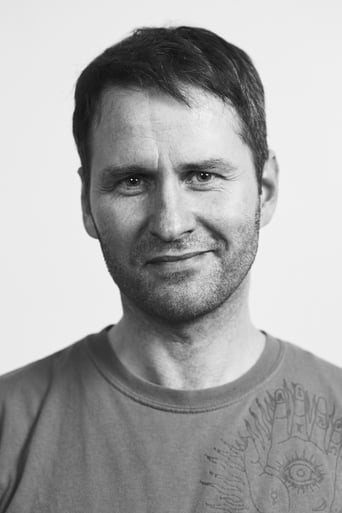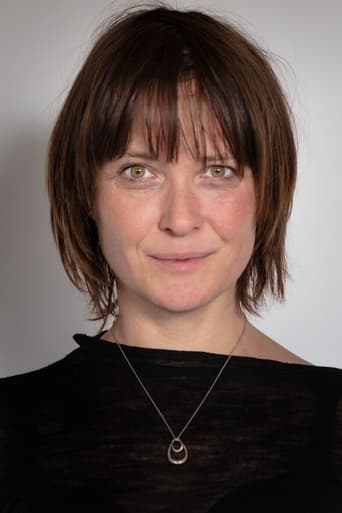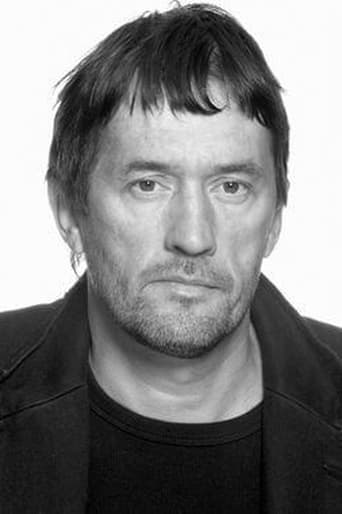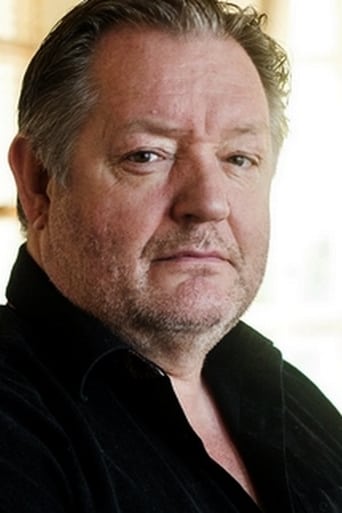Serina Robinson
White Night Wedding is not your typical romantic comedy. Set on a scenic remote island off of Iceland, the movie does have some of the qualities expected in classic Hollywood fare, such as eccentric characters, passionate lovers, and a wildly dramatic wedding scene. However, unlike Hollywood, director Baltasar Kormákur chooses to realistically portray his characters, complete with the starkness of unhappy marriages, the skeletons of broken dreams, and an entire kaleidoscope of mental quirks which are near, in some cases, to insanity. The movie is loosely based on the play Ivanov, by Anton Chekhov, and as the movie unfolds, it becomes apparent that themes of debt and marrying for money, as well as the temptation of suicide, are carried over from Chekhov's work. The movie was critically acclaimed and won seven Edda awards in Iceland. It is no surprise White Night Wedding was so popular, as it's witty combination of love, despair, and lunacy are interwoven seamlessly on the breathtaking island of Flatey.Love abounds in the film, in all of its varying stages. Indeed, as the movie progresses, we see it take the shape of puppy love between soon-to-be newlyweds, guilt-ridden love between an aging couple, and despairing, persistent love between Anna and Jon. Rather than confine White Night Wedding to a single, stereotypical romance, Kormákur depicts human emotions as they truly are: wild and changing as the sea surrounding the island of Flatey. All emotional extremes are mapped throughout the plot of this movie. The audience is captivated and saddened by Anna's desperate, and increasingly manic attempts to cling to her distant husband, while at the same time allured by Thora's flirtatious behavior and equally shocked by the dramatic discovery of their affair. We are simultaneously immersed in the marriage of Thora's parents, Larus and Sisi, who each are so wounded and blinded that they cannot comfort or support each other. Sisi is brutally absorbed in money, so much that her loyal husband Larus is left uncomforted to nurse his own unfulfilled dreams of becoming a famous opera singer. Throw in an uptight hairless priest, an overweight jovial best man, Thora's introverted, irritable sister, and a scrappy delusional golf-course owner, and the plot has expanded to encompass a motley group of characters all in the never-ending search of love and happiness.Despair also plays a key role in the movie, as a stark contrast to the jovial celebration in preparation for the wedding. Frequent flashbacks to Jon's previous marriage with an unstable, and desperate wife blur the lines between present and past. Anna's depression and metal problems are constantly on the edge of the plot, and are depicted in the form of pill bottles and hysteria without a clear diagnosis. The pity we may feel for Jon coming home to a dead swan in the garbage and seaweed placed throughout the house is equally tempered by the sympathy we feel for Anna, who is abandoned and cheated on by her silent husband. It causes the audience to wonder where Anna's mental instability has come from. Is it possible Jon's neglect is the cause of her lunacy? We see a common theme of unrequited love surface. The more fervently Anna yearns for her husband to be present, physically and emotionally, the more he shuns her. As a final blow, after a failed attempt to seduce him to "roll in the grass naked" with her, she catches him doing exactly that with young, fierce Thora who is determined to marry Jon from the day she set eyes on him. Anna is driven to the depths of despair, and an ultimately tragic ending. The audience is left to wonder, will the same fate will someday befall Thora? Finally, the eccentricities of the characters are especially prominent. Much like a dysfunctional family, the inhabitants of Flatey all share a wild white night before the wedding - which may be an allusion to the odd behavior of the characters in Shakespeare's Midsummer Night's Dream. While Anna is the only person who is clinically labeled as mentally unstable, all of the characters exhibit strange behavior at some point throughout the night. From Sjonni's drunken revelry to Larus's nude opera in the sea, the audience finds themselves personally intertwined in the odd lives of Flatey's inhabitants. Through exquisite filming technique that balances between wide sweeps of scenery and intimate close-ups, many of the scenes in the film attain a dream-like quality which leaves the audience unsure of reality. In this way, while depicting and creating flawed, and brutally realistic characters, Kormákur uses filming techniques to create varying tones of surreal passion, grief, and chaos. The traditional Icelandic folk music perfectly complements the landscape to portray Icelandic culture and set this film apart from the stereotypical romantic comedy. Indeed, the passionate nudity, harsh suicide, and extreme quirkiness of the film all are qualities often absent in Hollywood but is a hallmark of starkly realistic Nordic cinema.
jeremy3
After seeing this film, I wanted to see it again. The characters were so complicated. There was the middle aged professor, who had grown weary of his mentally ill wife and had fallen for a young student of his. There was his friend, a big oaf and church organist, who had never found true love in his life. There was the repressed priest, who was a step away from realizing that he had found the wrong calling. There were the future in-laws. The father of the bride is a working man, who has the voice of Luciano Pavrotti, and regrets he never tried to be a great tenor. There is the cynical and jealous mother of the bride, whose main reason for hating her future son-in-law is that he never has repaid a debt that he owes.This is all on an island in northern Iceland. It is a small island where everyone knows everyone else's dirty laundry, yet somehow fools still believe that they can hide their lives. There are the tourists from all over, who come to this island where there is basically nothing. Still, to scare up tourism, the locals foolishly believe that they can advertise the place as a tourist mecca. The groom and his childhood friend dream of the money that they will make when they build their golf course (basically, teeing off from the a rock out in the water).The movie is sad. The professor groom really hurt his wife, driving her to suicide by bringing his bride to be to the island for a wedding. In his perverse guilt, the groom believes that somehow he will bring peace over his adultery and abandonment of his wife. While not as good as The Sea, this is still a delightful movie that is filled with good witticism.
troche-5
Director of 101 Reykjavik Kormákur wants you to think there will be dark nights and an expensive wedding by misleading you with the title. However there are no dark nights in this Icelandic setting only a married bachelor, a disgraceful golf course, and a money hungry ogre. This dramatic comedy hailed as the most popular Icelandic film of 2008 has the funny dysfunctional family of meet the fockers paired with the drama of a mid day soap opera. The setting of the movie takes place in beautiful Iceland which was settled by the Norwegians in the 9th century. It's a really interesting place for a setting because it always seems like its day time due to the plentiful amount of sunlight. This movie was filmed during the summer solstice where Iceland experiences 24 hours of sunlight or just every morning to get this affect. With that being said we get to experience both the city and country life in this movie. Kormákur takes an interesting approach simultaneously showing you the past/present throughout the movie as you get to know the goods about each character. For example we get glimpses of Jon teaching and walking the streets of Reykjavik which occurred earlier in time line. As we're taken back and forth we get to witness first hand the struggles Jon had with his traumatic marriage and how he struggles in the present days before his second marriage. Jon is a man full of problems because you soon find out that he is debt with the mother of his future wife and we get to see how the escalated situation got to this point. I've always enjoyed this approach because in my opinion it has helped me better understand the movie. These "flashbacks" serve as a reminder to me and help me follow the movie. Just like in the epic Fight Club, the past/present film technique really helps you understand the struggle Jon is having with himself and not his wives. I think its way to easy to label Jon as a bad a husband or a bad man but honestly I saw his actions as a warning. It's not like he tried to get his ex student to fall for him but with that being said he doesn't prevent it and that causes the whole mess. Jon is just a writer looking for inspiration and cant handle being both a husband and a writer; I think this movie is a perfect example of a man torn between his two loves; work and pleasure. Oh the golf course and how significant it is, in my opinion it is a huge factor that lead to the domino effect. It all starts with the move away from the city and when Jon feels he needs something to do up pops up the GOLF COURSE IDEA. This leads to the debt, enhances his marital problems, and possibly a second wife…..In conclusion White Night Wedding has imperfect characters in an imperfect world that everyone can relate too. With that being said I think Jon is just a guy who knows what his worth as a partner is and doesn't want to hurt anyone. He understands that he is not suitable for the life as a husband but more of a bachelor. In my eyes this movie was the story of George Clooney getting hustled into a marriage and what becomes of it. The fun is in the chase or being chased after.
Josh Malay
"If your happy for more than ten minutes than you're an idiot." The character Jon Johnson described this philosophical advice to his class during the end of the movie and the quote fits perfectly. Throughout the movie we take up the aspect of love in marriage and like the quote the happiness, love, and commitment was fleeting. The best line in the movie lied in the notion that it is not love or happiness themselves which are most rewarding in life; rather it is the pursuit of these which is the most rewarding. The film, White Night Wedding explores this pursuit which in the process renders a variety of dismal outlooks on life and its potential for true love or happiness; yet for all these dismal outlooks the movie is quite interesting and somewhat hilarious taken as a whole.The premise of the film revolves around the main character Jon Johnson and his relationship to his wife Anna. Both, living together in Reykjavik, are dismally set in a routine of perceptual avoidance of one another – Jon refusing to take phone calls from Anna while teaching and Anna experiencing a worsening of her mental condition. In order to both remedy their marriage and better themselves they decide to move to a small island off Iceland from which Anna was originally from. This is where things began to get a little dicey both morally and technically. Jon having uprooted from his teaching position finds himself at odds with Anna and portrays a feeling of being trapped by Anna's condition and her perpetual wants and needs of him while he portrays that he gets nothing in return. With no work to divide his time from Anna, Jon invests in a nine hole golf course; the point up till now reflecting how relationships can become strained by the needs and desires of both parties especially when the initial honeymoon stage is over. Jon then begins to court and later has a affair with his former student Thora – Anna witnesses the affair and presumable kills herself – leaving Jon to marry Thora and start the cycle over once again.The plot though somewhat unique is an old story in divorce and cheating scenarios in which one member of the marriage (Jon) feels that he is sacrificing his life and work for Anna and her condition, while Anna feels that Jon has become increasingly distant and no longer loves her. This clash is culminated after Anna witnesses Jon having intercourse with Thora, Anna dumps her medication and proceeds to drag seaweed into the house and demands that Jon makes love to her; Jon, presumably more shocked by her actions and behavior declines and thus Anna appears to sail out to see to end her suffering. Though much quicker than a divorce, the act leaves Jon in the arms of Thora who vows that she will help him recover himself if it's the last thing she does, however, in the end the two – married – appear to be in the same place as Anna and Jon were at the beginning of the film. The implication of love and happiness being that it is found only in the chase and never lasts beyond that time.The question of marriage as an institution of benefit is only half the question presented within this film, the broader question and concern questioning whether happiness and love can even be found in life in a permanent means. Whether looking at Thora's parents and their lost dreams – her father wanting to be a famous opera singer – or Anna and Jon's relationship marriage as an institution seems to be a compromise which leaves both parties disappointed with one another and at odds than promising any form of happiness or love. This is one of the most dismal aspects of the film, yet even worse is the notion that love and happiness in anyone's life is ultimately fleeting. The film ends with the professor explaining this philosophical notion to his class, yet it is up to debate whether he has learned his own lesson. The question of which brings us to the final thought on this film, is someone morally obligated to leave a relationship which they are unhappy within? With the perception from the film being that happiness and love are fleeting fancies of pursuit rather than obtainable goals it would appear that the answer to this question is no. However, the film in Thora's persistence that she would recapture Jon's life if it was the last thing she did and Thora's father's perpetual longing to be an opera singer the question remains. To better the life of another and to better one owns life seem to be the two sides of this coin. Whether for better or for worse we as a species and as portrayed in this film seemed destined to fall in love and be happy in the process, yet this love and happiness is ultimately our curse as they are fleeting with time.




